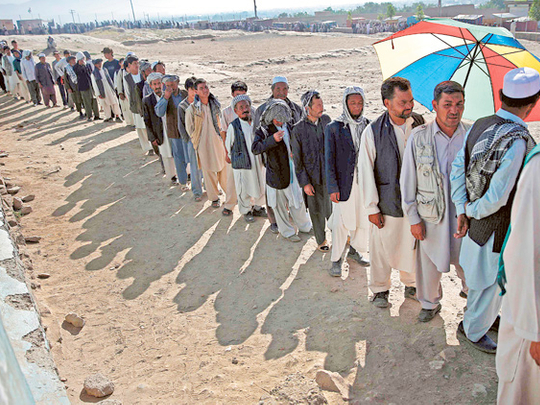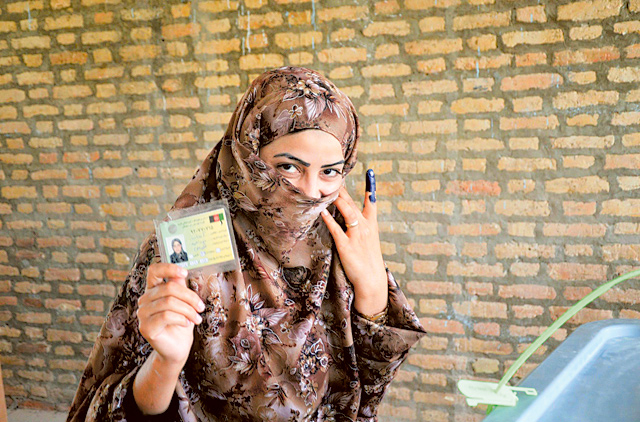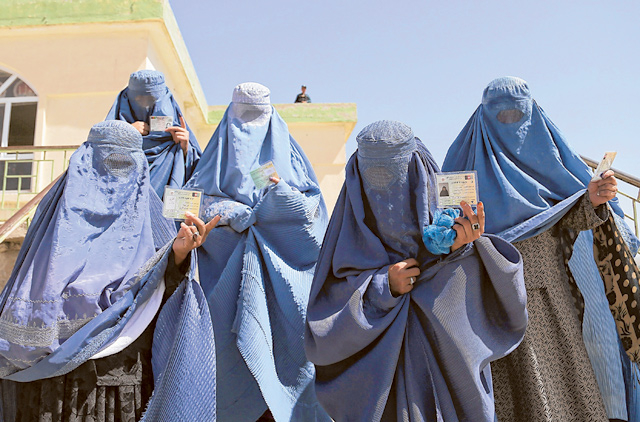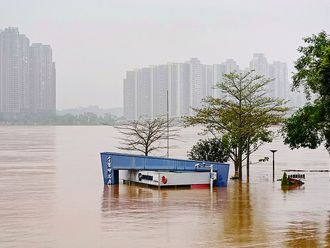
Kabul: Afghans defied Taliban threats to vote Saturday in a second-round presidential election, as US-led combat troops wind down a 13-year war that has failed to defeat the insurgents.
The early hours of voting were largely peaceful though officials said a Taliban rocket hit a polling station in the eastern province of Logar, killing two voters, and two rockets exploded near Kabul airport causing no casualties.
The run-off election will decide whether former foreign minister Abdullah Abdullah or ex-World Bank economist Ashraf Gani leads the country into a new era of declining international military and civilian assistance.
President Hamid Karzai is due to step down after ruling the country since 2001, when a US-led offensive ousted the austere Taliban regime for sheltering Al Qaida militants behind the 9/11 attacks.
“We are very proud to be choosing our favourite candidate,” he said after voting.
“Today Afghanistan goes from a transition period toward long-lasting peace and stability.”
A smooth handover in Afghanistan’s first democratic transfer of power would be a major achievement for the international effort to establish a functioning state after the depredations of the Taliban era.
In the first-round vote in April, the insurgents failed to launch a single high-profile attack and voter turnout was more than 50 per cent.
But the stakes were high on Saturday with the Taliban issuing specific threats to target polling stations and widespread fears that electoral fraud could produce a contested result.
On the eve of the run-off, UN head of mission Jan Kubis issued a stark warning to candidates’ supporters not to resort to the ballot-box stuffing that marred the 2009 election when Karzai retained power.
Both candidates cast their ballots in Kabul before dipping a finger in ink to register that they had voted.
“We do not want even one fraudulent vote for us,” Abdullah told reporters, while Ghani said via Twitter: “We ask everyone to prevent, avoid and discourage people from rigging.”
Abdullah secured 45 per cent of the first-round vote with Ghani on 31.6 per cent, after investigations into fraud claims from both sides.
The two candidates came top of an eight-man field in the April election, triggering the run-off as neither reached the 50 per cent threshold needed for outright victory.
Security and jobs
On the campaign trail, they offered similar pledges to tackle rampant corruption, build much-needed infrastructure and protect citizens from violence.
“I want someone who can improve our economy, create jobs and improve our lives,” said Janat Gul, 45, a shopkeeper voting in Kabul.
“If the economy is good there will be no insurgency, everyone will be busy working, not fighting.”
Harsh terrain and poor roads make holding an Afghan election a logistical challenge, with thousands of donkeys used to transport ballot boxes to remote villages.
Counting the ballot will take weeks. The preliminary result is due on July 2 and a final result on July 22.
Ahead of the vote, the Taliban said that polling booths would be targeted by “non-stop” assaults.
“By holding elections, the Americans want to impose their stooges on the people,” the insurgents said on their website.
On Saturday, they said their fighters had attacked scores of polling stations and security outposts around the country, but Afghan officials reported no major assaults.














